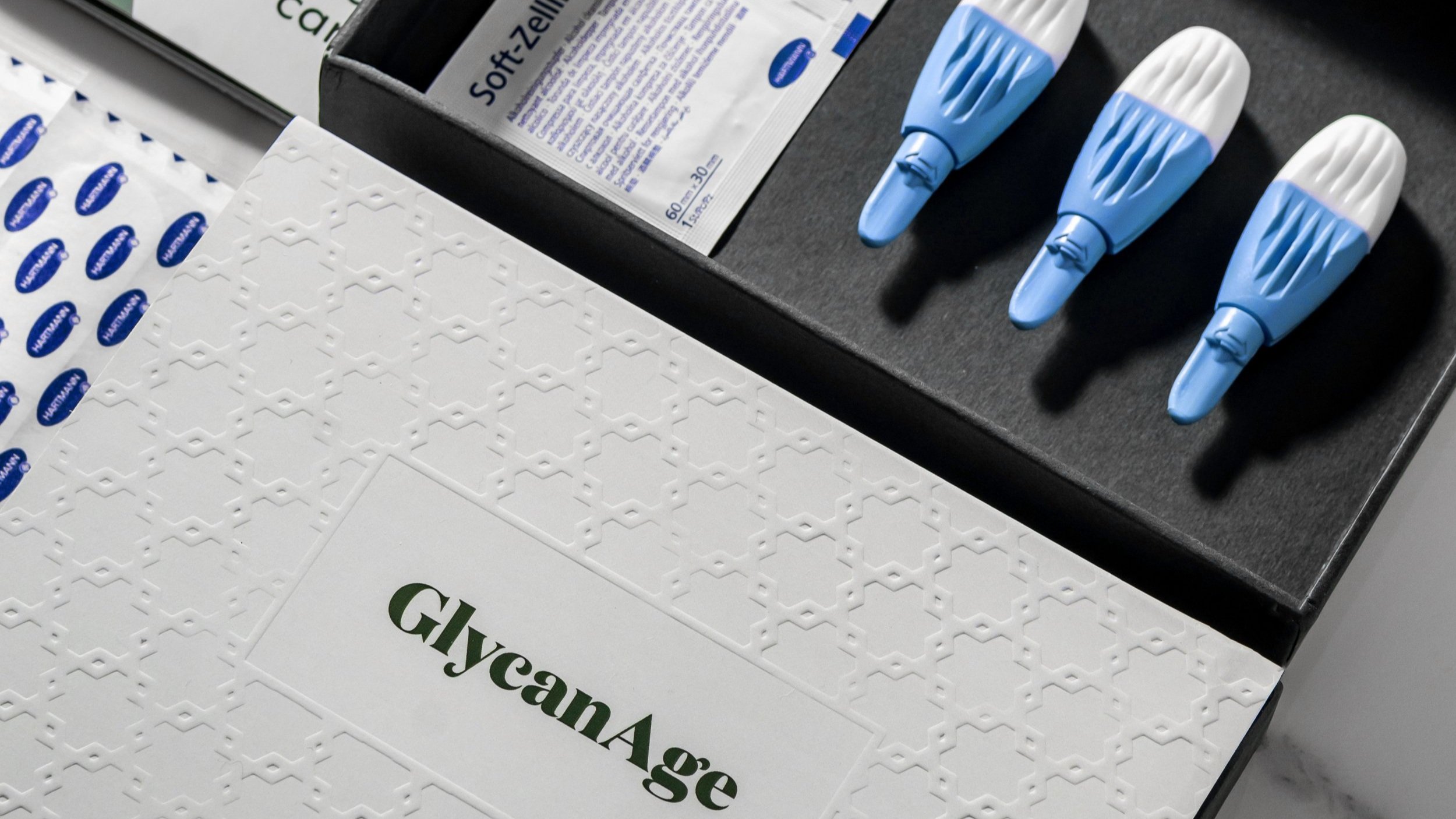
Determine optimal health solutions based your biological age.
GlycanAge Testing
What is GlycanAge Testing?
GlycanAge testing is an advanced diagnostic tool that assesses your biological age by analyzing specific glycans in your blood. Glycans are complex carbohydrate molecules found on the surface of cells and in bodily fluids. They play a crucial role in various physiological processes, including immune response and inflammation regulation.
This test focuses on measuring 29 different glycan structures extracted from your blood sample. These glycans are categorized into pro-inflammatory and anti-inflammatory types. The balance between these types provides insights into your body's chronic inflammation levels, which are closely linked to aging and overall health.
By understanding your biological age through GlycanAge testing, you gain a deeper insight into how your lifestyle choices, such as diet, exercise, stress management, and medical interventions, impact your inflammatory profile. This knowledge empowers you to make informed decisions to optimize your health and potentially prevent age-related diseases.
How Does GlycanAge Testing Work?
GlycanAge testing begins with a simple blood sample, typically obtained through a finger prick. The sample is then analyzed in a specialized laboratory environment where advanced techniques are used to extract and examine the glycans. During analysis, the test identifies specific glycan structures that are indicative of your body's inflammation status. For example, glycans rich in sialic acid (S) and galactose (G2) are considered anti-inflammatory, while those lacking these components (G0) may contribute to pro-inflammatory conditions.
The results of GlycanAge testing provide a detailed breakdown of your glycan profile, including ratios and indexes that reflect your biological age. These insights are presented in a clear and actionable format, helping you and your healthcare team to tailor interventions that can positively impact your health outcomes.
GlycanAge testing goes beyond traditional age assessments by focusing on molecular markers of aging associated with chronic inflammation. It serves as a powerful tool for proactive health management, offering personalized recommendations to support longevity and well-being.
Understanding the Relevance of Knowing Your Biological Age
Chronic inflammation significantly contributes to age-related conditions such as cardiovascular issues, metabolic disorders, autoimmune conditions, and more. Understanding one's biological age through GlycanAge testing is crucial as it provides insights into how inflammation impacts overall health. This knowledge empowers individuals to implement targeted interventions like lifestyle changes and personalized treatments, which can effectively mitigate inflammation, reduce the risk of age-related diseases, and enhance general wellness.
During menopause, hormonal fluctuations exacerbate inflammation levels, intensifying health challenges. GlycanAge testing becomes particularly valuable during this phase as it offers insights into inflammatory processes specific to menopause. These insights help women strategize effectively to manage symptoms such as hot flashes, mood swings, and changes in skin elasticity, which are influenced by inflammatory responses. By identifying these specific areas, GlycanAge testing enables women to adopt proactive measures and personalized interventions to optimize their health and well-being throughout menopause and beyond.
What Can I Learn From My GlycanAge Test Results?
Understanding your GlycanAge results provides valuable insights into various aspects of your health and aging process. Each glycan index—Glycan Shield (S), Glycan Youth (G2), Glycan Mature (G0), Glycan Median (G1), and Glycan Lifestyle (B)—offers specific information about how your body manages inflammation and overall health. These scores not only indicate potential risks associated with chronic inflammation but also guide personalized recommendations aimed at optimizing immune function, metabolic health, cardiovascular well-being, and lifestyle choices.
How does GlycanAge compare to other tests?
GlycanAge offers unparalleled predictive capabilities for future health outcomes, providing crucial insights well before potential issues emerge. This early detection empowers proactive and effective action, enabling individuals to address health concerns preemptively. Beyond identifying early health risks, GlycanAge also identifies the most effective solutions and targets for specific lifestyle changes. By offering a comprehensive understanding of the factors influencing chronic inflammation and biological aging, GlycanAge equips individuals with actionable insights to promptly enhance their overall well-being.
Frequently Asked Questions
-
Glycans are sugar molecules that modify proteins in your body, reflecting your lifestyle choices and indicating the inflammatory state of your immune system, which affects your biological age. They significantly influence your unique biology and are regulated by both genetic factors and environmental and lifestyle choices in nearly equal measure.
-
IThe accuracy of biological age tests hinges on their relevance to long-term health outcomes, reliability, and personalization. GlycanAge excels in these areas, predicting future health conditions and hospitalization risks better than most aging clocks and traditional biomarkers.
With an error margin of less than 1%, GlycanAge ensures trustworthy results by performing multiple tests on each sample. Developed over 30 years of research, it is supported by 200+ peer-reviewed publications and a dataset of 200,000 samples from leading biobanks, representing diverse ages, genders, and ethnicities.
-
No. GlycanAge measures glycosylation, not glycation. Glycation is a random process where glucose attaches to proteins, while glycosylation is a regulated process that adds specific sugars to specific protein parts during synthesis. Different sugars can attach to the same protein part, similar to how different words use the same letters or how people with different eye colors have the same vision. This sugar variation, akin to genetic mutations, is inherited from multiple genes, not just one.
-
This test is designed for individuals aged 18 and older and is not suitable for those who have received a blood transfusion or gamma globulin blood derivatives (like intravenous immunoglobulin preparations) in the past six months.
If you are on blood-thinning medications or have a blood clotting disorder, consult your physician before taking the test. The GlycanAge test is not recommended for anyone under 18, as children and young adults have a distinct IgG glycan profile.
For those who have recently suffered from pneumonia, flu, or other acute infections with complications, wait at least one month after recovery before giving blood samples for a GlycanAge test.
You are eligible for the test if you suffer from other diseases or illnesses; however, report any diseases or therapies to your GlycanAge advisor, as some conditions and treatments can affect your GlycanAge result.
It is safe to take during pregnancy, but pregnancy can affect your result. If you are pregnant, it is advisable to take the test after your normal menstrual cycle has re-established post-pregnancy.
Certain medications can affect your result. If you are taking any medications, including corticosteroids, contraceptives, or other hormonal therapies (such as IVF treatment), report this to your GlycanAge advisor.
-
Yes, research indicates that menopause can accelerate aging. A small study found an approximate 9-year increase in biological age as women enter menopause. Additionally, a larger study of about 2,000 women discovered a doubling of the aging rate during perimenopause.
To stay younger after menopause, finding a routine that works for you is key. Hormone Replacement Therapy (HRT) is effective for many women, but finding the right dosage and type is crucial. GlycanAge can help measure your progress with HRT. Additionally, maintaining a healthy weight, engaging in regular exercise, eating and sleeping well, avoiding smoking, and managing stress all contribute to overall wellness and can help reduce your GlycanAge.
-
This test poses no greater risk than a standard blood draw. If you have health concerns that could complicate a typical blood withdrawal, particularly if you're on blood-thinning medication or have a blood clotting disorder, consult your physician about the test's safety.
GlycanAge Test Pricing
$485 / test
We recommend a second, follow-up test after 6 months.


